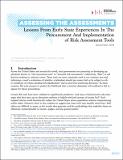Assessing the Assessments: Lessons From Early State Experiences in the Procurement and Implementation of Risk Assessment Tools

View/
Published Version
https://cyber.harvard.edu/publication/2018/assessing-assessmentsMetadata
Show full item recordCitation
Bavitz, Christopher, Sam Bookman, Jonathan Eubank, Kira Hessekiel, and Vivek Krishnamurthy. 2018. Assessing the Assessments: Lessons From Early State Experiences in the Procurement and Implementation of Risk Assessment Tools. Berkman Klein Center for Internet & Society research publication.Abstract
For state and local officials, considering the development, procurement, implementation, and use of Risk Assessment (RA) tools can be a daunting endeavor.This report provides context for those making these decisions, beginning with brief case studies of four states (Kentucky, Wisconsin, California, and Pennsylvania) that have adopted (or attempted to adopt) such tools early on and describes their experiences.
It then draws lessons from these case studies and suggests some questions that procurement officials should ask of themselves, their colleagues who call for the acquisition and implementation of tools, and the developers who create them.
This report concludes by examining existing frameworks for technological and algorithmic fairness.
The authors offer a framework of four questions that government procurers should be asking at the point of adopting RA tools. That framework draws from the experiences of the states we study and offers a way to think about accuracy (i.e., the RA tool’s ability to accurately predict recidivism), fairness (i.e., the extent to which an RA tool treats all defendants fairly, without exhibiting racial bias or discrimination), interpretability (the extent to which an RA tool can be interpreted by criminal justice officials and stakeholders, including judges, lawyers, and defendants), and operability (the extent to which an RA tool can be administered by officers within police, pretrial services, and corrections).
Terms of Use
This article is made available under the terms and conditions applicable to Other Posted Material, as set forth at http://nrs.harvard.edu/urn-3:HUL.InstRepos:dash.current.terms-of-use#LAACitable link to this page
http://nrs.harvard.edu/urn-3:HUL.InstRepos:37883502
Collections
Contact administrator regarding this item (to report mistakes or request changes)


